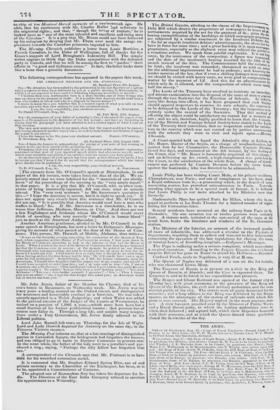23. Portland Place, 11th August 1535.
have the honour to acknowledge the receipt of your note of last evening in answer to the Dim from myself of the preceding day. Presuming that you intended your reply ate a disavowal of the offensive expressions contained in that part of your reported speech which had allusion to ruy self, and to which your attention was called, I am satislied with the answer yon have given. As an incorrect report of your speech has been made riblic through the press, I beg to inffirm you that I deem it due to myself that the eta respoudence which has taken place should also be published. I am, Sir, very respectfully, your obedient servant,
The extracts from Mr. O'Connell's speech at Birmingham, in our paper of the 4th instant, were taken from the Sun of the 2d. We ex- pressly stated that we were indebted for the " materials of our abridg- ment " of the proceedings of the meeting to the "very ample report" in that paper. It is a pity that Mr. O'Connell, who so often com- plains of being incorrectly reported, did not state what he actually uttered. The "very next sentence " to Mr. Stevenson's quotation is this—" I hope the assertion is untrue, but it is right to speak out." It does not appear very clearly from this sentence that Mr. O'Connell did not say, " Is it possible that America would send here a man who traffics in blood," &c. If Mr. Stevenson is a Slaveholder, he is no worse than Jefferson, Madison, Monroe, or Clay. Arid there are not a few Englishmen and Irishmen whom Mr. O'Connell would never think of assailing, who very recently "trafficked in human blood" just as much as the American Ambassador.]
Another American gentleman, alluded to by Mr. O'Connell in the same speech at Birmingham, has sent a letter to Galignani's Messenger, giving his account of what passed at the door of the House of Com- mons. This person, Mr. Harwell, of Mobile, Alabama, thus writes- .. It was on the Saturday evening succeeding the coronation of the Queen of En;- laud. when, supposing neither House of Path:uncut in session, I had gone flow n to the House of COMMODS, intending to look at the interior of that and the House of Lords. When I reached the door of the House of Commons, the doorkeeper informed me that the Commons were in session t at the moment ho pointed me out Daniel O'Connell. who w as approaching, awl said he mould give me an or.ler to hear the de- bates if I would ask Imo. I bad hardly time to reply that I should du no such thing,
when, having arrived, the door-keeper said to hint, ' O'Couuell; have you a sure
order for this gentleman?' Remembering, as I dill, his former calumnies upon the Americans, I should have forgotten both the respect due to my country and myself if I could have accepted an order from him ; and i at once said to him—' Sir, I am au American and a Southerner.' (This intelligence which I gave him he has made his own sagacity supply.) Ile replied,' You are then twin n slave.hobli lig state !'—' Yes, from Alabama.'—' You :lie a slaveffiolder yourself. I presume?'—' Yes.'—''Then I cannot give you an order.'—' Sir, it was the doorkeeper who asked you ; no American would ask or receive one from y ou.


























 Previous page
Previous page